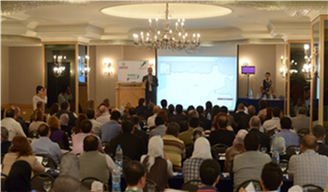
Local organization Al Hadatha Association is working to promote social cohesion in northern Lebanon through the creation of mixed Lebanese and Syrian community committees. These committees came together at the Naseej Conference on Oct. 30, 2013, along with donors and international organizations, to discuss local needs and potential solutions.
More than 200 people attended the conference, including representatives of the United Nations, European Union and other international organizations. USAID’s Office of Transition Initiatives supported the event, including trainings, conference logistics, participant transportation and informational products.
“The conference made us realize that we are imposing a huge burden on the host community in underprivileged villages. We hope this conference will lead to action,” said a Syrian committee member.
Both Lebanese and Syrian members presented on behalf of their committees. Local follow-up from the conference has been swift and effective. As a result of the trainings, the committees assessed needs in their villages, determined priority issues, and proposed solutions. Since the conference, several community activities have been funded by donors, including U.N. funding for a vocational school in the village of Mechmech and for garbage trucks and water tank vehicles in the village of Mhamara.
The conference trainings were designed to create and support committees of Lebanese residents, Syrian refugees and municipality representatives in 13 villages in Akkar. These villages in particular are facing serious resource, economic and social strains resulting from the Syrian refugee influx. In some villages, the number of refugees is equal to or greater than the Lebanese population.
The day ended with the creation of five sector working groups, which gave attendees an opportunity to discuss cooperation on a regional level. Many of the villages in the surrounding area are facing similar challenges and could benefit from the lessons of the conference.







Comment
Make a general inquiry or suggest an improvement.